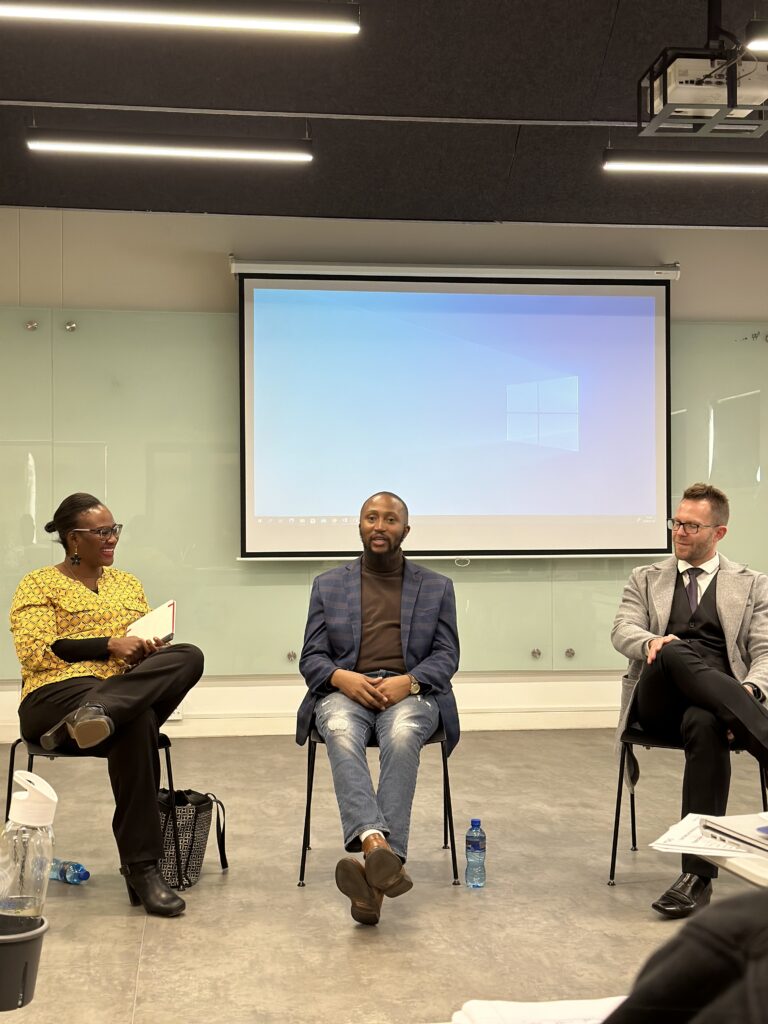By Columbo Amedekanya, Pedro de Melo, and Onthatile Msweli
During our research trip to South Africa for the Transcultural Student Research Group (TSRG 2024), we had the chance to attend an insightful session on Environmental, Social, and Governance (ESG) and critical skills on the third day. The workshop underscored the significance of digital transformation in today’s rapidly changing environment. In addition, it covered various fields where demand is strong in South Africa with abundant opportunities and provided valuable insights on using technology to operate sustainably.

The Trend Toward Sustainable Technology
One of the main takeaways from the workshop was the necessity for companies to embrace technological innovation as a vehicle for achieving sustainable operations and performance. The workshop presented PwC’s 27th annual global survey of business leaders, which revealed that 54% of CEOs prioritize investment in their existing businesses as well as in digital transformation. There are many reasons for this shift. For example, the increasing importance of a good work-life balance, the unpredictable political context, rapid urbanization, and the progress observed in the technological field.
We’ve also been reminded of the vitality of our planet’s well-being. This is crucial and should concern us all. It’s clear that no one will benefit if it deteriorates. And no matter the financial gains, they won’t do any good if they come at the planet’s expense. A damaged planet benefits no one.
To monitor this transition effectively, it is crucial to establish clear and measurable processes and to understand, analyze, and interpret ESG data.
The workshop particularly reinforced the fact that decisions taken today will have a major impact not only on our generation but also on future generations.
New Career Paths and Skill Sets
This transition to digital transformation brings a range of new professions that require new qualifications and skills. One recurring concern is whether technological developments might lead to job losses. The workshop clarified that while technologies themselves won’t cause job losses, those who adapt and acquire new skills will succeed, whereas those who don’t may face job displacement. It is fundamental to provide young people with the resources and opportunities they need to keep pace with these changes.
The workshop also identified areas of demand. In South Africa, there are great opportunities in sectors such as energy management, renewable energy, retail, and agriculture. To meet this need, numerous measures have already been implemented. We have organizations supporting and mentoring young people in their career choices and facilitating their entry into the job market. Among these organizations is Afrika Tikkun.
In this digital age, jobs in the fields of cloud computing, AI, and cybersecurity were among the topics we discussed. For instance, Microsoft has invested heavily in AI to improve productivity and reduce error rates.

Critical Thinking and Adaptability
A portion of the workshop was dedicated to promoting critical thinking. How can we successfully transform things that are usually disposed of into something of benefit to many? This attitude is vital, especially in the unique context of Africa, where adaptability and resilience are crucial to navigating the current economic landscape.
The focus was also on the effective use of robots. An example of routine tasks was given. These tasks can be delegated to robots, giving people the freedom to engage in more meaningful and complex work. This would make better use of our potential and creativity.
Conversation with MDP Students
In the last section of the workshop, we had the chance to share ideas with students from the University of Pretoria’s Master of Philosophy in Development Practice (MDP) program. A report published by UNICEF in 2023 gives an idea of the perspective of youth on sustainability. According to the report, 70% of young people in South Africa believe that a change in attitude can help solve global problems. However, they are also aware of South Africa’s main problems, such as resource management, financial accountability, policy implementation, and outdated regulations, which are seen as the main obstacles to change in South Africa.
In our conversation with the students, it became clear that essential services, such as free healthcare, are crucial for many. However, these services are often located far away from the communities that need them most. We must ensure that these solutions are accessible when they are being developed and implemented, and we must always be mindful of those who are going to benefit from them.
